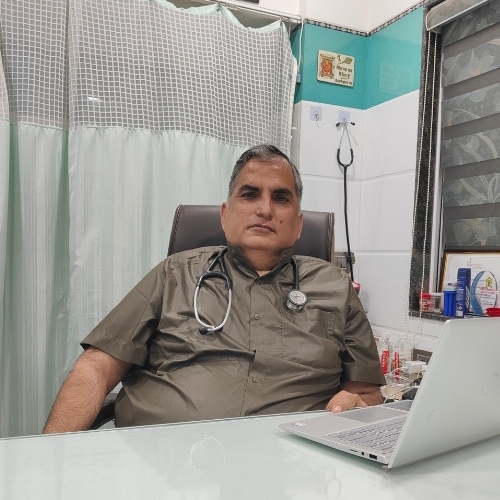
Our Painless Delivery & Family Planning Centre is dedicated to providing safe, comfortable, and advanced maternity care. We specialize in painless (epidural) delivery, government-approved abortion services, and family planning solutions, ensuring the well-being of mothers and newborns.
- Cesarean Section (C-Section) – Safe and expert surgical delivery for high-risk pregnancies.
- Government-Approved Abortion Centre – Legal, confidential, and safe Medical Termination of Pregnancy (MTP) services.
- Government-Recognized Family Planning Centre – Free and subsidized contraceptive services, counseling, and permanent sterilization procedures.
- IUD Insertion & Contraceptive Counselling – Expert guidance on birth control methods, including Copper-T and hormonal implants.
- Tubectomy & Vasectomy – Safe and minimally invasive permanent sterilization procedures.
- High-Risk Pregnancy Care – Specialized treatment for mothers with diabetes, hypertension, or other complications.
Comprehensive cancer care with advanced technology and compassionate treatment.
Cesarean Section (C-Section)
Safe and expert surgical delivery for high-risk pregnancies.
Introduction to Cesarean Section (C-Section)
A Cesarean Section, commonly known as a C-section, is a surgical procedure used to deliver a baby through incisions in the mother's abdomen and uterus. It is often recommended for high-risk pregnancies or when vaginal delivery poses a threat to the mother or baby. C-sections are performed under spinal or epidural anesthesia, ensuring a safe and controlled delivery experience.
When a C-Section is Recommended
C-sections may be planned in advance for medical reasons such as placenta previa, breech presentation, multiple births, or previous C-sections. They may also be performed in emergency situations when complications arise during labor, such as fetal distress or prolonged labor. The decision is made with the goal of ensuring the best possible outcome for both mother and baby.

Benefits of Expert Surgical Care
With advancements in surgical techniques and hospital care, C-sections are now safer and more efficient than ever. Expert care ensures minimal blood loss, reduced infection risk, and a smooth post-operative recovery. Surgeons and maternity teams closely monitor the mother and baby before, during, and after the procedure to ensure optimal health and safety.
Recovery and Postnatal Care
Most mothers stay in the hospital for 2–4 days following a C-section and can begin gentle activities within a few days. Complete recovery typically takes 4–6 weeks, during which time proper wound care, pain management, and support with baby care are essential. With attentive postnatal care, mothers can recover well and begin their parenting journey confidently.

Government-Approved Abortion Centre
Legal, confidential, and safe Medical Termination of Pregnancy (MTP) services
Introduction to Government-Approved Abortion Centres
Government-approved abortion centres provide legal, safe, and confidential Medical Termination of Pregnancy (MTP) services as per the guidelines set by national health authorities. These centres are licensed and regulated to ensure that women receive professional care in a supportive and respectful environment. The goal is to safeguard women’s health while upholding their reproductive rights.
Safe and Legal Abortion Services
Only certified medical professionals perform abortions in these centres, following strict protocols to minimize risks and complications. Depending on the pregnancy stage, methods include medical abortion (using pills) or surgical procedures. All procedures are carried out with informed consent and adherence to legal time limits and medical standards.

Confidentiality and Patient Support
Patient confidentiality is a top priority. Women are treated with dignity and respect, and their privacy is strictly maintained throughout the process. Counseling is often provided to ensure emotional readiness and to inform patients about the procedure, aftercare, and future contraceptive options.
Comprehensive Women’s Health Care
In addition to MTP services, many government-approved centres offer broader reproductive health care including contraception, STI screening, and post-abortion counseling. These centres play a critical role in empowering women with choices, ensuring their safety, and promoting long-term reproductive well-being.

Government-Recognized Family Planning Centre
Free and subsidized contraceptive services, counseling, and permanent sterilization procedures
Introduction to Government-Recognized Family Planning Centres
Government-recognized family planning centres provide essential reproductive health services, helping individuals and couples make informed decisions about birth control and family size. These centres operate under national health programs and offer safe, legal, and accessible options for contraception, including both temporary and permanent methods.
Free and Subsidized Contraceptive Services
A wide range of contraceptive options is available at these centres, often free or at a subsidized cost. These include oral contraceptive pills, condoms, intrauterine devices (IUDs), and injectable methods. The affordability and accessibility of these services play a key role in preventing unintended pregnancies and promoting reproductive autonomy.

Counseling and Education
Trained healthcare providers offer personalized counseling to help individuals choose the most suitable contraceptive method based on their health, lifestyle, and family goals. Education on sexual and reproductive health, safe practices, and managing side effects is also provided, empowering individuals to make responsible health decisions.
Permanent Sterilization Procedures
For those seeking long-term solutions, the centres also offer permanent sterilization procedures such as tubectomy for women and vasectomy for men. These procedures are safe, effective, and performed by qualified professionals. By offering a full spectrum of family planning services, these centres support healthier families and communities.

IUD Insertion & Contraceptive Counselling
Expert guidance on birth control methods, including Copper-T and hormonal implants.
Introduction to IUD Insertion & Contraceptive Counselling
IUD insertion and contraceptive counselling services are essential components of modern reproductive health care. These services provide individuals with expert guidance on effective, long-term birth control methods like the Copper-T and hormonal implants. The goal is to offer safe, personalized options that align with each person’s health needs and lifestyle.
IUD Insertion Services
Intrauterine Devices (IUDs), such as Copper-T and hormonal IUDs, are small, T-shaped devices inserted into the uterus to prevent pregnancy. They are highly effective, reversible, and can last for 5–10 years depending on the type. The insertion is a quick, outpatient procedure performed by trained medical professionals with minimal discomfort.

Contraceptive Counselling
Comprehensive contraceptive counselling helps individuals understand the benefits, side effects, and suitability of different birth control options. This includes IUDs, pills, implants, condoms, and permanent methods. Counselling ensures that each person can make informed decisions based on their reproductive goals, health status, and personal preferences.
Safe and Supportive Environment/h6>
All services are provided in a confidential, respectful, and supportive setting. Follow-up care and monitoring are also offered to ensure the continued effectiveness of the chosen method and to manage any concerns. Through these services, individuals are empowered to take control of their reproductive health with confidence and clarity.

Tubectomy & Vasectomy
Safe and minimally invasive permanent sterilization procedures
Introduction to Tubectomy & Vasectomy
Tubectomy (for women) and vasectomy (for men) are permanent sterilization procedures that provide a long-term solution for individuals or couples who no longer wish to have children. These procedures are safe, minimally invasive, and highly effective methods of contraception, ensuring that individuals can confidently manage their reproductive health without the need for ongoing contraception.
Tubectomy Procedure
Tubectomy, also known as female sterilization, involves the surgical closure or removal of the fallopian tubes, preventing eggs from reaching the uterus for fertilization. The procedure is typically performed under general or local anesthesia and can be done through small incisions or laparoscopy. It is a permanent form of contraception with a high success rate and minimal risk of complications.

Vasectomy Procedure
Vasectomy is a simple surgical procedure for men where the vas deferens (the tubes that carry sperm) are cut, tied, or sealed, preventing sperm from being released during ejaculation. The procedure is typically done under local anesthesia in a clinic setting, with minimal discomfort and a quick recovery time. It is a permanent and highly effective method of male contraception.
Benefits and Follow-up Care
Both tubectomy and vasectomy are cost-effective, long-lasting, and require no ongoing maintenance. These procedures are ideal for those who are certain they do not want to have any more children. Follow-up appointments are essential to ensure the success of the procedure, and any concerns or complications can be addressed promptly by healthcare providers.

High-Risk Pregnancy Care
Specialized treatment for mothers with diabetes, hypertension, or other complications
Introduction to High-Risk Pregnancy Care
High-risk pregnancy care involves specialized medical attention for mothers who face complications during pregnancy, such as diabetes, hypertension, or other pre-existing health conditions. It aims to ensure the safety and well-being of both the mother and baby by closely monitoring and managing potential risks. This type of care is essential for addressing challenges that may arise during pregnancy and childbirth.
Managing Diabetes in Pregnancy
Pregnant women with diabetes, including gestational diabetes, require careful monitoring of blood sugar levels throughout their pregnancy. Specialized care includes tailored dietary plans, insulin therapy (if needed), and regular screenings for potential complications such as preeclampsia or fetal growth issues. Managing diabetes helps reduce the risk of complications during delivery and ensures better outcomes for both mother and baby.

Hypertension and Other Complications
Pregnancy-induced hypertension (PIH) or preeclampsia requires frequent blood pressure monitoring and sometimes medication to keep levels in check. Other complications, like thyroid disorders, blood clotting issues, or kidney disease, are also carefully managed with appropriate treatments to reduce the risk of severe outcomes. Early detection and intervention are crucial for protecting both maternal and fetal health.
Comprehensive Care and Monitoring
High-risk pregnancies involve a multidisciplinary team, including obstetricians, endocrinologists, cardiologists, and nutritionists, who work together to monitor the health of both mother and baby. Frequent ultrasounds, lab tests, and fetal monitoring may be required to detect and address any emerging issues. With the right care, many high-risk pregnancies can result in healthy deliveries, ensuring a positive outcome for both mother and child.




